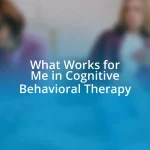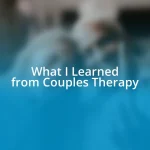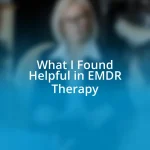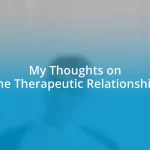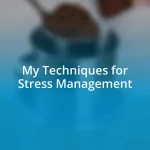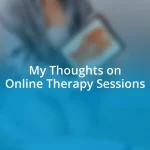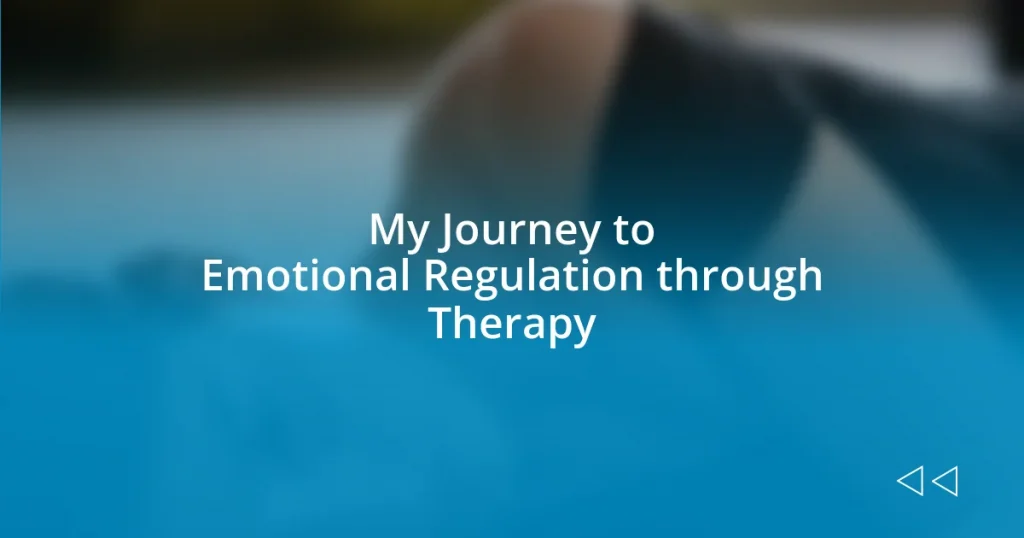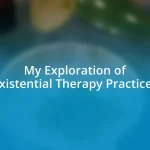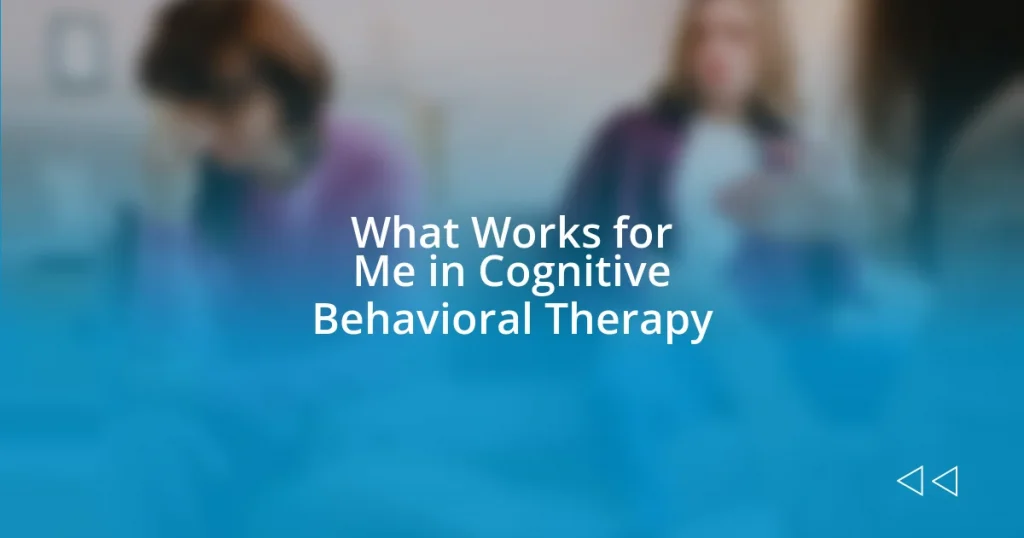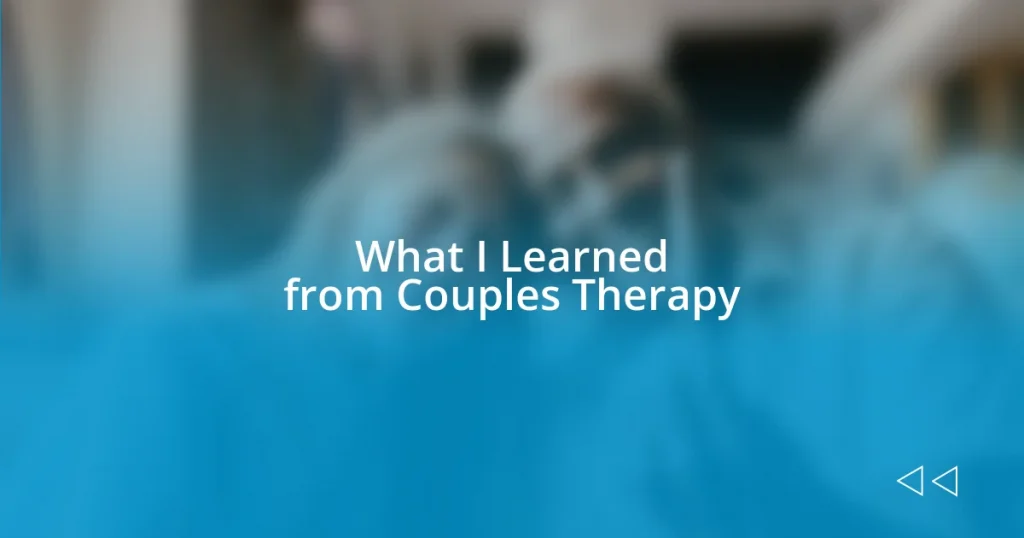Key takeaways:
- The journey of emotional regulation involves acknowledging and experiencing emotions rather than suppressing them, leading to deeper connections with oneself and others.
- Therapy fosters personal growth by providing skills such as self-awareness, coping strategies, and perspective, which help navigate emotional challenges.
- Measuring progress in emotional regulation includes recognizing patterns in emotional responses and celebrating small victories, which is essential for fostering resilience and awareness.
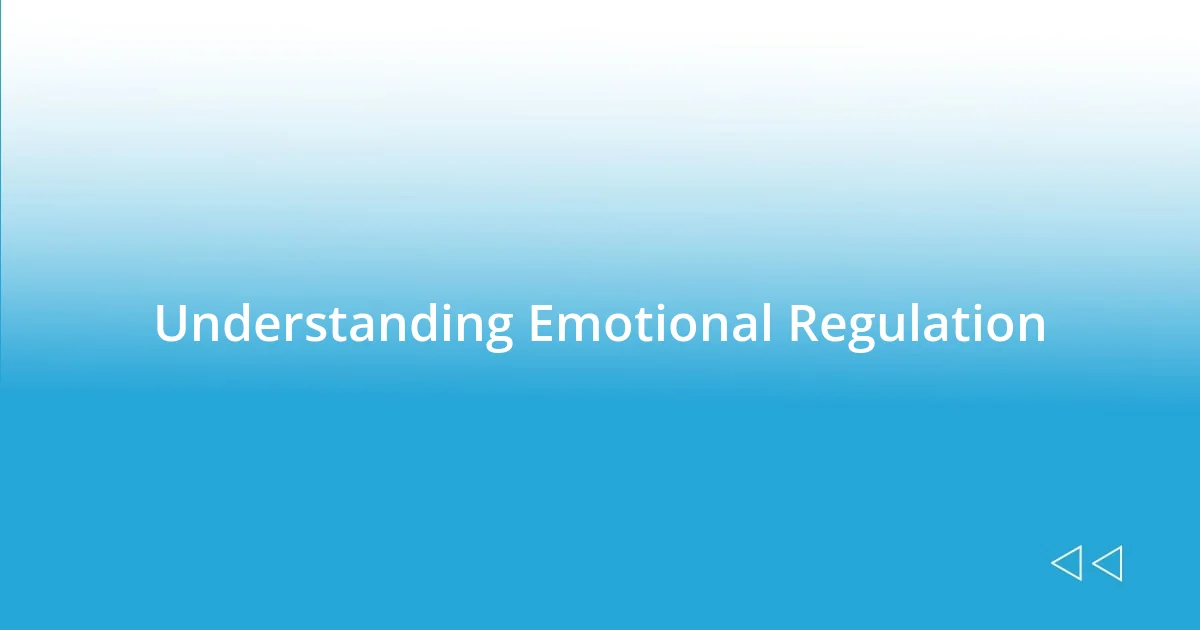
Understanding Emotional Regulation
Emotional regulation is the ability to manage and respond to emotional experiences in a healthy way. I remember a time when I was overwhelmed by anxiety during social situations. It was fascinating to realize that instead of avoiding these events, learning to identify my emotions helped me better navigate those feelings.
It’s interesting how our emotions can become so powerful that they overshadow our rational thinking. Have you ever felt that surge of anger or sadness that felt uncontrollable? I certainly have, and through therapy, I discovered techniques that allowed me to pause and assess my emotions instead of reacting impulsively. This shift gave me a sense of empowerment.
I’ve found that understanding emotional regulation is not just about suppression; it’s about acknowledging feelings as they arise. Embracing vulnerability opened doors for me, sparking deeper connections with myself and others. What if we allowed ourselves to just feel, without judgment? That realization marked a significant step in my journey toward emotional health, reminding me that it’s okay to experience every emotion fully.
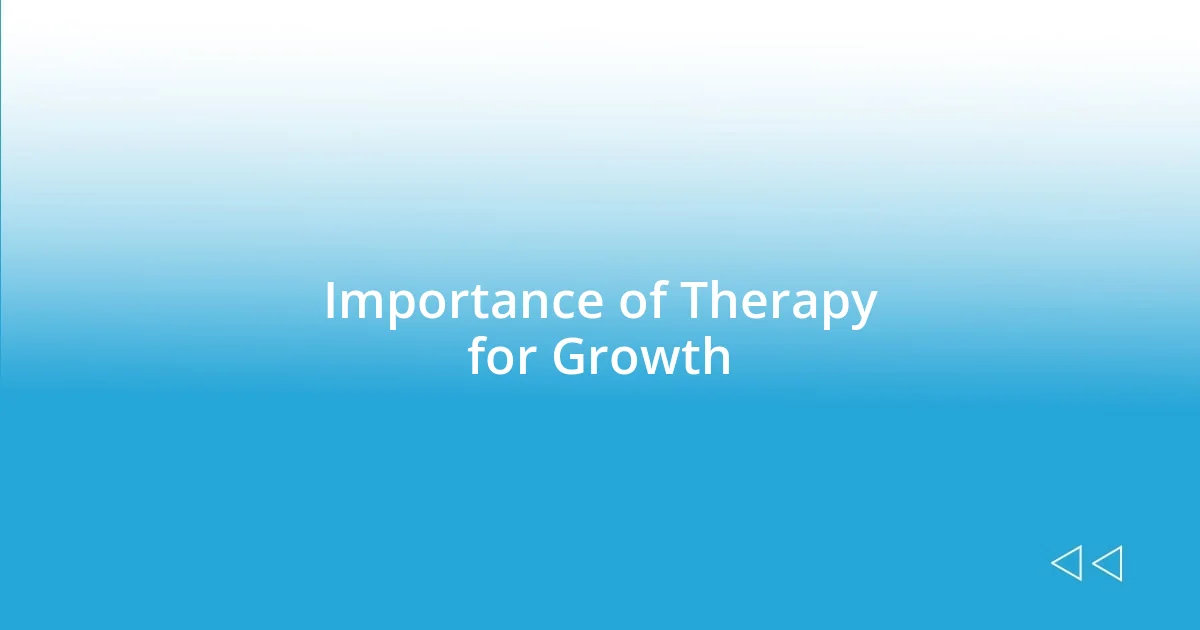
Importance of Therapy for Growth
Engaging in therapy can be a transformative experience that fosters personal growth. I’ve often reflected on moments when I felt lost, and my therapist helped me see those struggles as opportunities for learning. This perspective shift enabled me to embrace challenges rather than shy away from them.
Therapy lays the groundwork for essential skills that contribute to our growth, such as:
- Self-awareness: Developing a clearer understanding of our emotions and triggers.
- Coping strategies: Learning practical tools to manage stress and emotional upheaval.
- Accountability: Having someone who supports our journey and encourages responsibility for our growth.
- Perspective: Gaining insights from an outside perspective that help us reevaluate our situations.
- Empathy: Building a deeper connection with ourselves and others as we learn to navigate our emotions.
Every session became a stepping stone, guiding me toward understanding that emotional growth isn’t linear; it’s a complex yet beautiful process of self-discovery. It’s thrilling to imagine how each lesson learned can ripple out into various aspects of life, transforming not just how I handle emotions but also how I engage with the world around me.
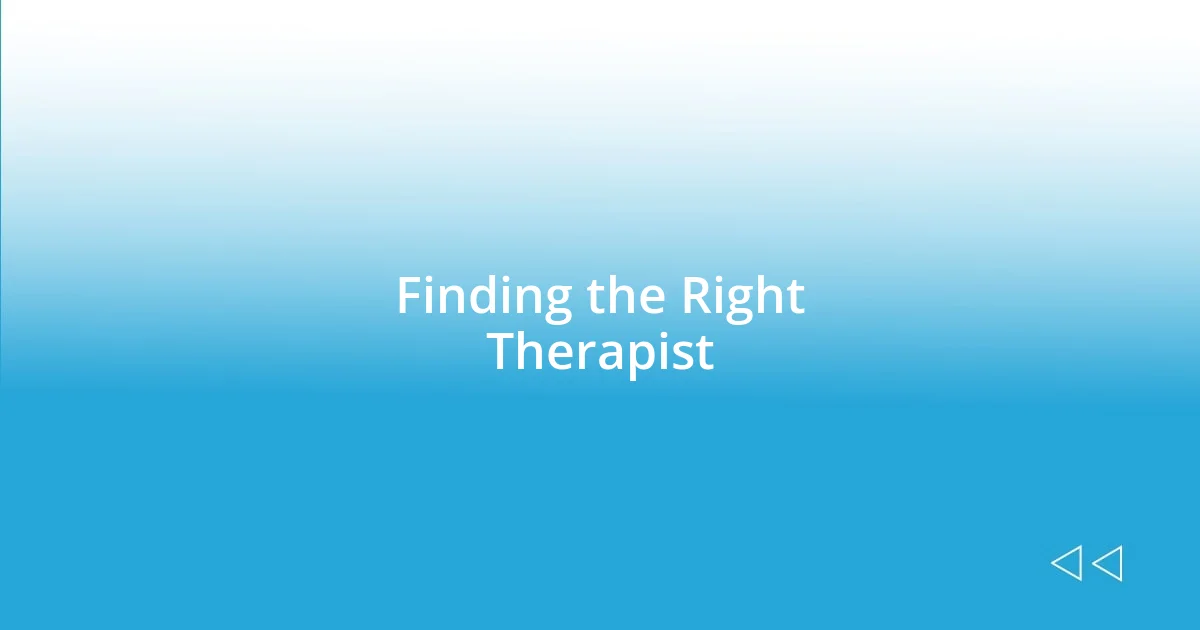
Finding the Right Therapist
Finding the right therapist can feel like searching for a needle in a haystack. I remember sifting through countless profiles, trying to decode which therapist might understand my struggles. It took time, but I learned that it’s crucial to prioritize compatibility. Just like ordering your favorite coffee, you want a therapist who shares similar values and approaches that resonate with you.
I found it vital to consider the therapist’s experience and specializations. For example, if you’re dealing with anxiety like I was, finding someone with a focus on anxiety management really made a difference. During my initial consultations, I noticed that when I asked about their methods, their passion and enthusiasm for their work shone through. That connection helped me feel safe and understood, which is essential for effective therapy.
Don’t underestimate the value of intuition in this process. There was a moment during my first session with a therapist when I felt an unexpected wave of relief wash over me—it was as if my soul recognized a safe space. Trusting your feelings can guide you to the therapist who’s right for you. Remember, they’re on your side—so finding the right match can be a game-changer in your journey towards emotional regulation.
| Considerations | Details |
|---|---|
| Compatibility | Ensure their values and approach align with your own. |
| Experience & Specialization | Look for therapists with expertise in areas relevant to your struggles. |
| Intuition | Trust your feelings about the therapist during sessions. |
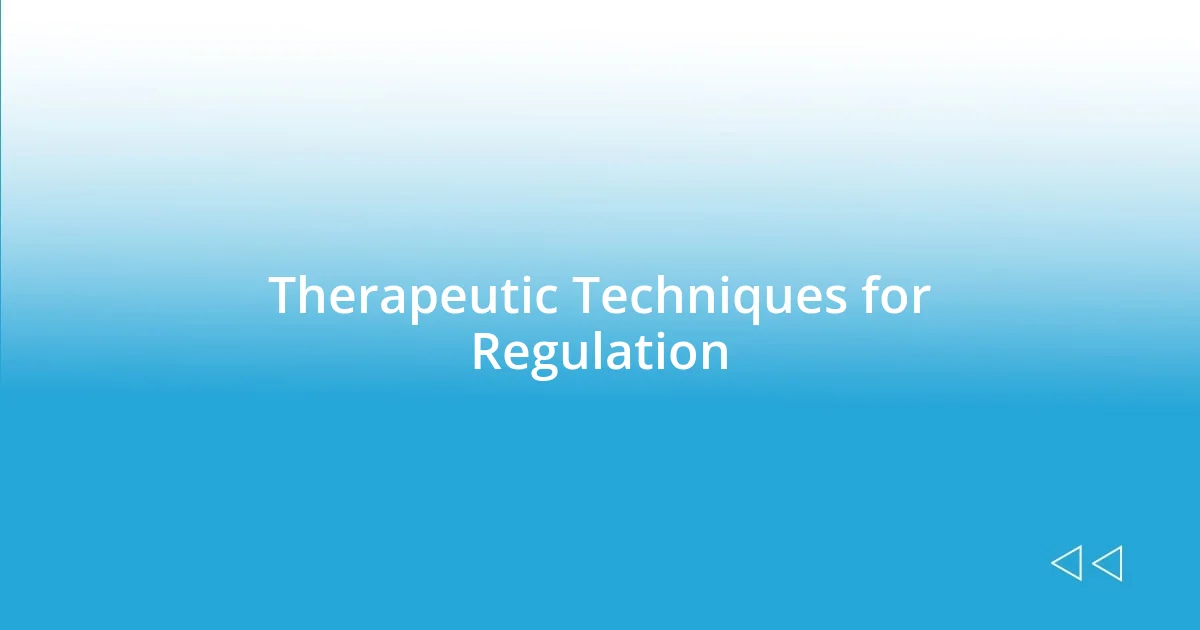
Therapeutic Techniques for Regulation
One therapeutic technique that resonated deeply with me was mindfulness. I recall the first time my therapist guided me through a breathing exercise. As I focused on each inhale and exhale, I felt a wave of calm wash over me—like a refreshing breeze on a sweltering day. This simple practice taught me to anchor myself during emotional storms, allowing me to observe my feelings without becoming overwhelmed.
Another method that proved invaluable was cognitive-behavioral therapy (CBT). Through CBT, I learned to identify and challenge negative thought patterns that often clouded my judgment. I remember journaling about a particularly challenging situation, where I discovered that my self-criticism stemmed from past experiences rather than reality. This revelation opened my eyes to the importance of reframing my thoughts and cultivating a more compassionate narrative about myself.
Lastly, my exploration of expressive arts therapy offered an unexpected outlet for my emotions. There were days when words failed me, but painting or writing poetry allowed me to communicate what I couldn’t express verbally. I found it fascinating how creativity becomes a bridge to understanding our inner worlds. Have you ever tried to express your feelings through art? It’s a powerful reminder that emotional regulation isn’t just about managing feelings but also about exploring and embracing them in various forms.
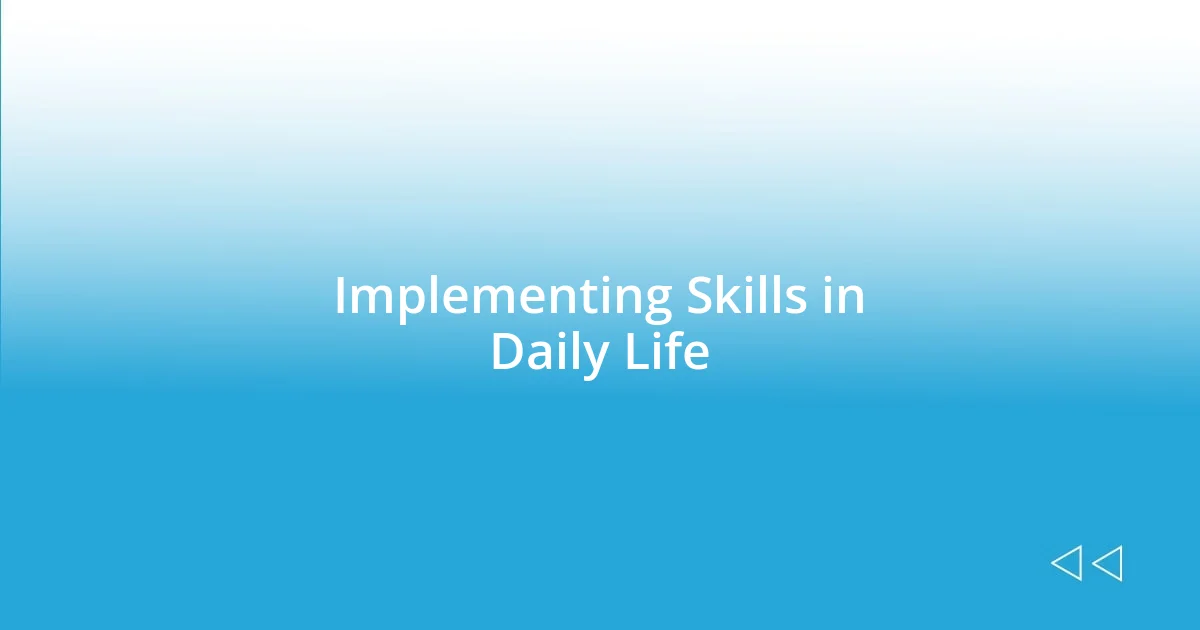
Implementing Skills in Daily Life
Implementing the skills I gained from therapy in my daily life has been a transformative experience. One morning, I woke up feeling the familiar weight of anxiety settle in. Instead of succumbing to it, I decided to use the mindfulness techniques I had practiced. As I stood by the window, I focused on my breath, letting the crisp air fill my lungs. Gradually, the tightness in my chest eased. It was a small victory, but a significant one in my journey toward emotional regulation.
Throughout my day-to-day routine, I learned to apply cognitive-behavioral strategies to challenge negative thoughts. For instance, when a self-critical thought popped up during a work meeting, I paused and asked myself, “Is this really true?” This simple question often shifted my perspective. I remember a time I almost faltered during a presentation due to doubts about my abilities, but I managed to remind myself of my preparation and past successes. Shifting that narrative helped me speak with confidence and ease.
Moreover, incorporating expressive arts into my daily routine became a form of emotional release. On particularly heavy days, I’d spend an hour sketching or doodling, allowing my emotions to flow onto the page. It sounds whimsical, but this act grounded me in a way I hadn’t anticipated. Have you ever felt a surge of relief after creating something? It turns out that engaging in creative expression not only provides an outlet but can also enhance emotional awareness. In those moments, I truly discovered the power of my feelings and the importance of nurturing them.
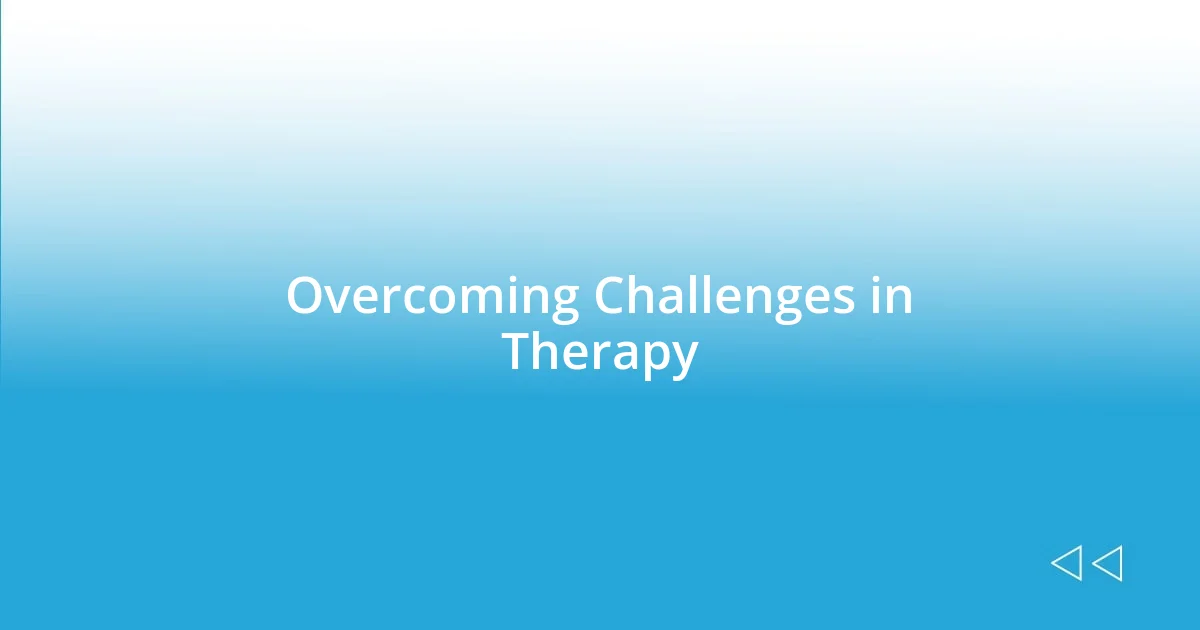
Overcoming Challenges in Therapy
The journey through therapy is rarely a smooth ride. I remember my initial reluctance to share my thoughts openly; it felt like pulling teeth. But each time I summoned the courage to voice my fears, I noticed a shift—like a dam breaking. It was exhausting, but I recognized that discomfort was necessary for growth. Have you ever felt that way? That feeling of needing to push through the awkwardness can be daunting, yet it’s a crucial step toward emotional liberation.
Embracing vulnerability in therapy was another hurdle I had to overcome. I vividly recall a session where I was asked to delve into a painful memory. My heart raced at the thought of reopening old wounds, but as I confronted the past, I found unexpected relief. It was an emotional rollercoaster, yet I left the session feeling lighter. The act of facing our challenges can be intimidating, but isn’t it true that often the things we fear the most hold the key to our healing?
On this path to emotional regulation, I’ve learned that setbacks are a natural part of the process. There was a time when I felt like I was backpedaling after making progress. I remember thinking, “What’s wrong with me?” But my therapist reminded me that healing isn’t linear. It’s like climbing a staircase; sometimes you’ll take two steps forward and then one back. Those moments taught me resilience and patience. Have you ever encountered setbacks in your journey? It’s all part of the dance of healing, and understanding this can make the process feel a bit less daunting.
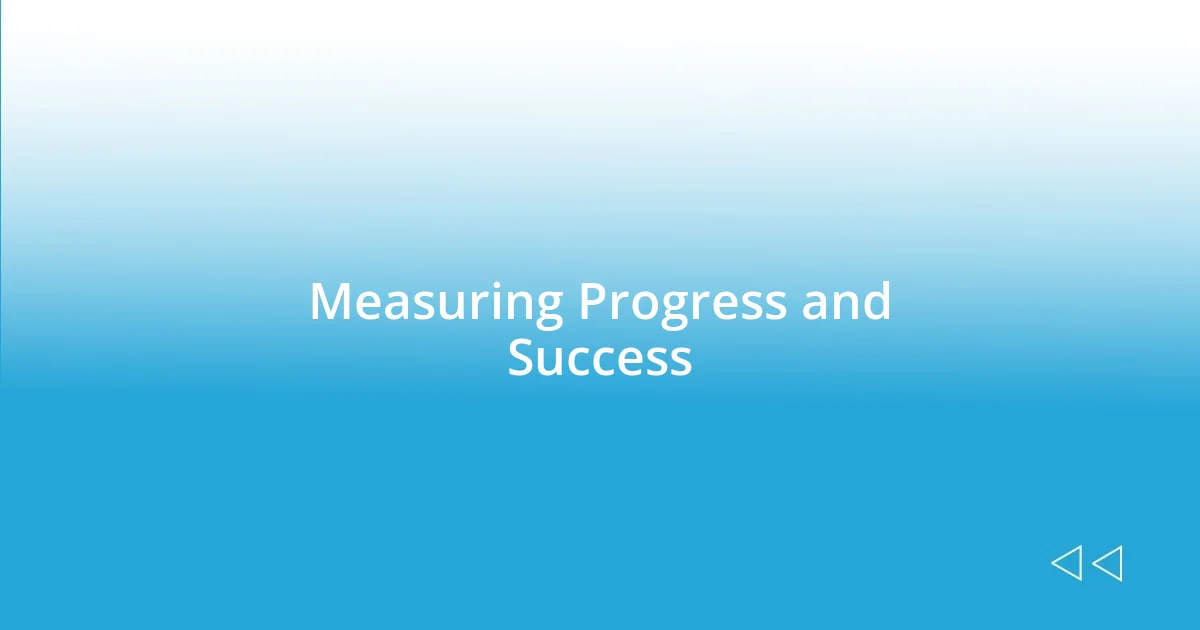
Measuring Progress and Success
Measuring progress in emotional regulation can sometimes feel elusive, yet I’ve found that tracking my emotional responses was incredibly revealing. I remember a week when I kept a journal, noting how I felt during various situations. Initially, my entries reflected chaos and confusion. However, over time, I started to notice patterns—specific triggers and the corresponding reactions—allowing me to pinpoint areas where I was genuinely making strides. Have you ever noticed how writing things down can clarify thoughts that seem tangled in your mind?
When it comes to gauging success, the small wins deserve just as much celebration as the monumental ones. During one particularly challenging month, I noticed my emotional outbursts decreasing, even when frustration flared. I hadn’t started yelling, a previous habit, but instead found myself taking a deep breath and stepping away to collect my thoughts. This was a breakthrough for me! It felt empowering to realize that I didn’t have to revert to old patterns; I could choose a different path. This shift might seem subtle, but it marked a significant change in my approach to my emotions.
Ultimately, I learned that progress isn’t solely about the absence of negative feelings; it’s about cultivating a deeper awareness of my emotional landscape. One day, while engaging in a group therapy session, I shared how I felt overwhelmed at my job but instead of spiraling, I took a moment to breathe and assess the situation. The feedback from my peers was heartening; they applauded my insight, reminding me that recognizing an emotional response is often the first step toward regulation. Has there been a moment where you’ve caught yourself in a similar situation? Celebrating those moments of awareness can be the fuel that propels us forward on our emotional journey.


